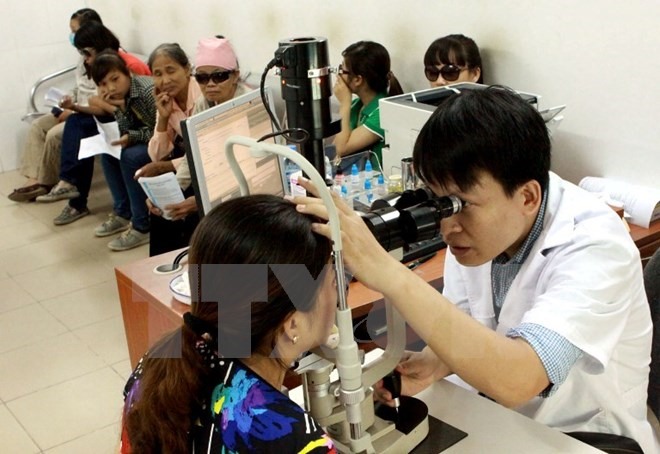 Society
Society

Pinkeye cases have been occurring nationwide in a scattered manner, but they are tending to increase and can spread rapidly if preventive measures are not taken, health experts warn.
 |
| A doctor at the Central Eye Hospital in Ha Noi examines a patient.—Photo VNA |
HÀ NỘI – Pinkeye cases have been occurring nationwide in a scattered manner, but they are tending to increase and can spread rapidly if preventive measures are not taken, health experts warn.
The Hà Nội-based Central Eye Hospital reported that it had seen an increase in the appearance of pinkeye among outpatients.
The hospital’s Doctor Lê Xuân Cung said the number had not increased over last year, and is not an outbreak, but the increase was still “unusual.”
Pinkeye cases usually peaked in summer, but the slight increase in the number of patients during spring time was unusual, he explained. Hot weather in the first days of spring this year could be a reason, he added.
"It is noticeable that the number of infected people were concentrated in crowded apartment buildings with poor circulation," he said.
Dr. Hoàng Minh Anh, head of Synthesis Faculty at the Central Eye Hospital, said that in wet-weather conditions of the winter-spring season, the pinkeye causing virus developed and spread in the air, so anyone could get infected.
“Pinkeye virus then spreads rapidly through direct contact with an infected person via the respiratory tract, tears, saliva and handshake,” he said.
Therefore, people with pinkeye should go to eye hospitals for examination and follow up.
“People should not buy medicine without doctor advice. In some cases, pinkeye-patients can develop complications that lead to vision loss if they don’t go by a doctor’s advice,” Anh said.
To actively prevent and fight pinkeye disease, the city’s Department of Preventive Medicine has advised people to wash their hands frequently with soap, using clean water. They should not touch other places after rubbing their eyes with their hands, specially their nose and mouth. They should also not share personal items such as eye drops bottles, towels, glasses and masks.
At health centres or at home, utensils used by an infected person should be washed by soap and/or antiseptic disinfectant.
Those who suspect an infection should limit contact with others, stay out of school or office.
So far there is no vaccine or specific treatment for the disease, and those with pinkeye can still get infected again after several months of recovery. — VNS




